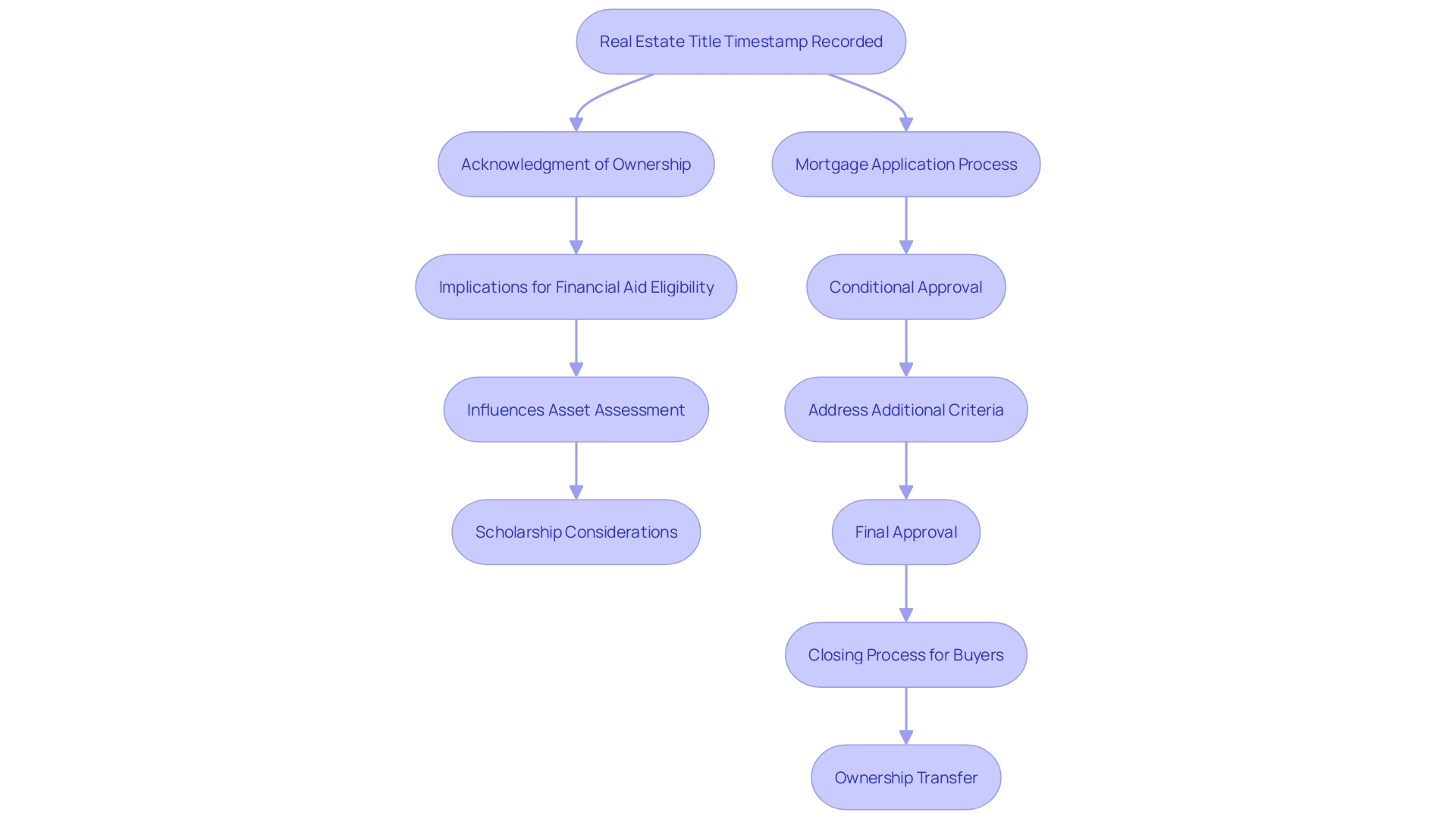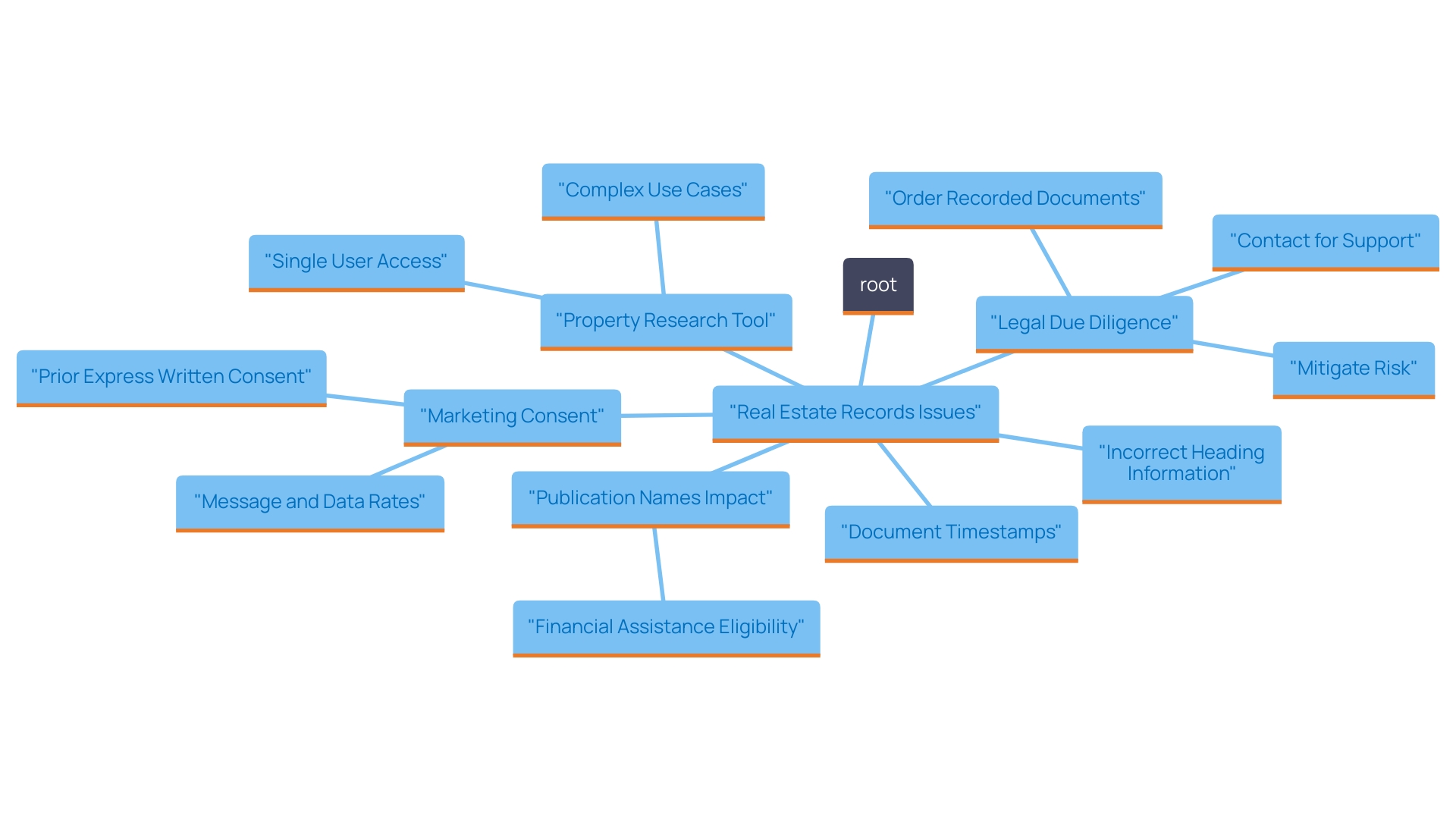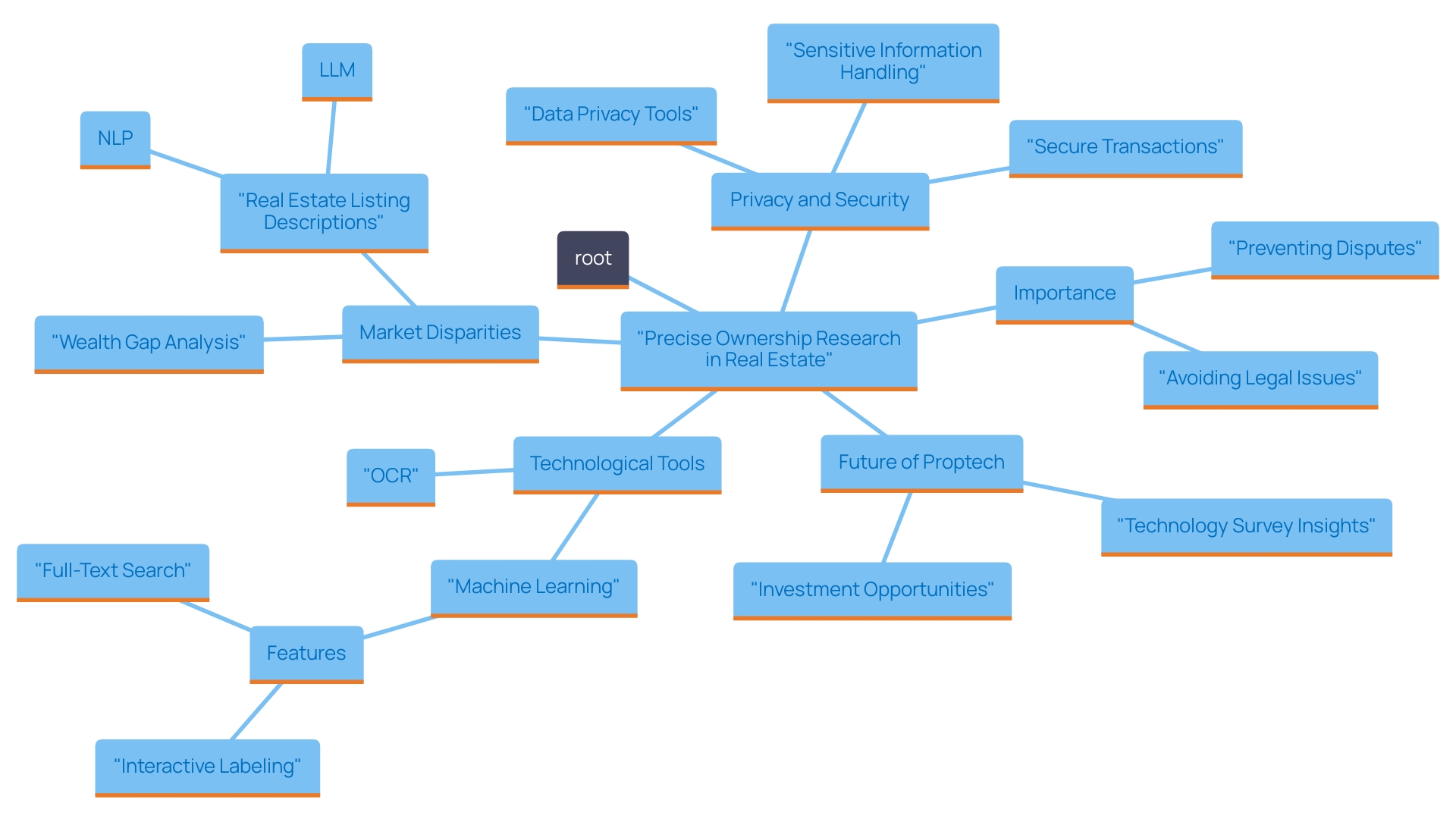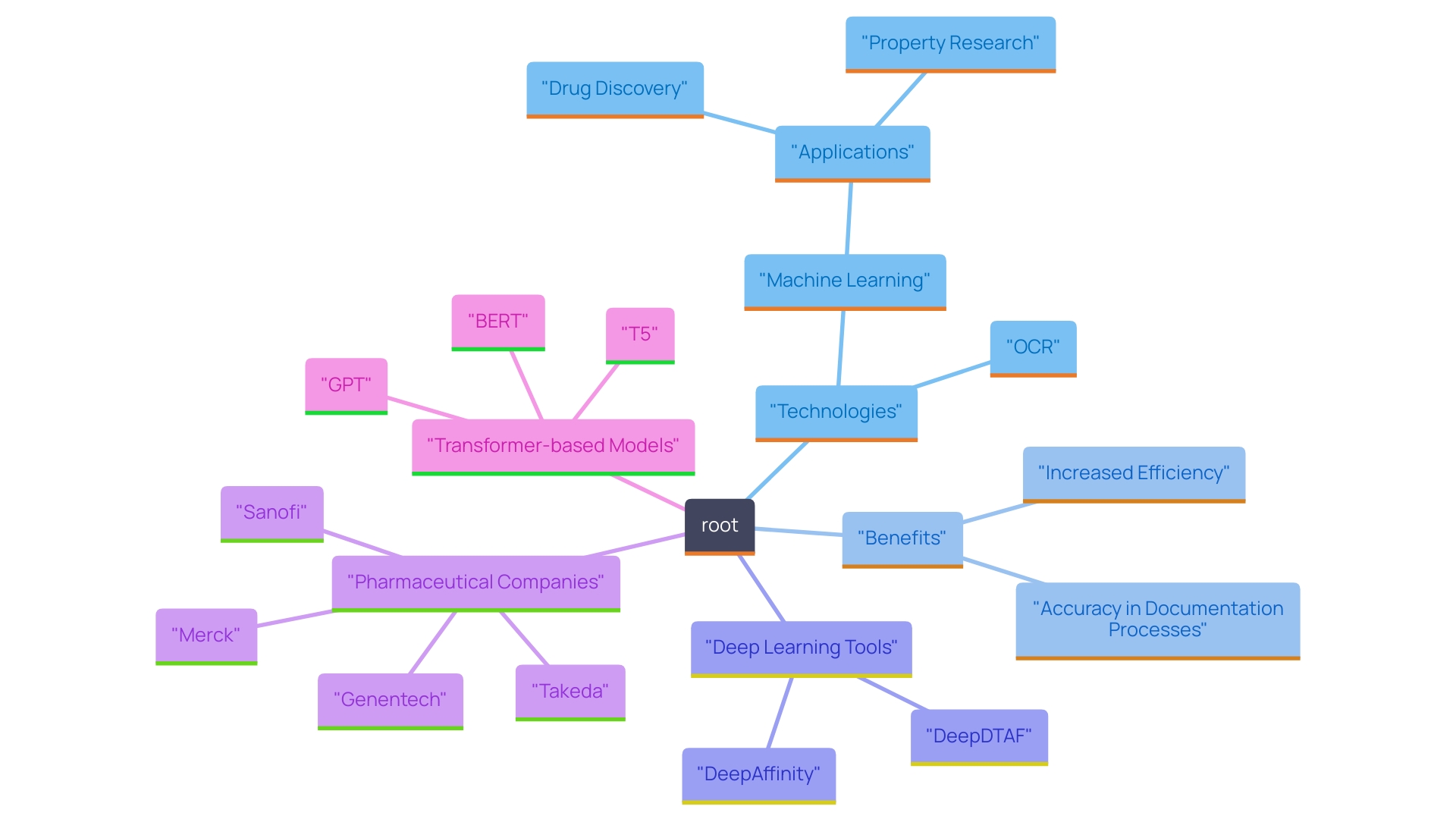Introduction
In the intricate landscape of real estate transactions, the significance of the Real Estate Title Date cannot be overstated. This pivotal date marks the official recording of property ownership, serving as a cornerstone for legal recognition and financial assessments. For individuals navigating the Common Application process, particularly those seeking financial aid or scholarships, understanding the implications of the title date is essential.
Misunderstandings or inaccuracies can lead to complications that may jeopardize eligibility for financial assistance. As technology continues to reshape the realm of title research, the integration of advanced tools is enhancing the accuracy and efficiency of managing property records. This article delves into the critical aspects of the Real Estate Title Date, common inquiries surrounding it, and the transformative role technology plays in ensuring precise title research, ultimately paving the way for smoother real estate transactions.
Understanding Real Estate Title Date in the Common Application
The Real Estate Title Timestamp denotes the particular moment when the is officially documented in public records. This moment is crucial as it signifies the point at which ownership of the real estate is legally acknowledged.
In the context of the Common Application, comprehending the submission timeframe is crucial for applicants who may need to provide precise asset details, particularly if they are applying for assistance or scholarships that take real estate holdings into account.
The designation timestamp can influence the assessment of the asset and may contribute to deciding eligibility for specific financial aid programs.

Common Questions About Real Estate Title Date for Applicants
Property owners and potential purchasers often seek clarity on various aspects of real estate records. Common questions include:
- How can I find the document timestamp for my property?
- What actions should be taken if the heading information is incorrect?
- Does the name of the publication affect my eligibility for financial assistance?
To determine the registration time, individuals can access documents at their local county recorder's office or utilize online databases that offer . It’s advisable to have the location’s address and any relevant identification ready when making inquiries.
Errors in naming timelines can result in major problems, including ownership conflicts and monetary difficulties. For instance, liens, errors, missing documents, and forgeries can stall or derail the sale of a home. Jacob Michael, CEO of Louisville Cash Real Estate, emphasizes the importance of resolving such issues, noting, 'If a lien is discovered, the seller must work with the creditor to negotiate a payoff or release the lien before closing the sale.'
Grasping the heading timestamp is also essential for monetary disclosures, especially when stating the worth of possessed assets during funding applications. A distinct and precise label ensures that ownership is accurately depicted, which is crucial for preserving eligibility and preventing possible legal or financial issues. Case studies have demonstrated that resolving ownership defects, such as liens and recording issues, is crucial for enabling successful real estate transactions, emphasizing the significance of careful ownership management.

The Importance of Accurate Title Research
Precise ownership research is essential in real estate transactions as it ensures that property ownership is accurately established and documented. Mistakes in document dates or ownership records can lead to disputes, legal issues, and financial complications.
The role of technology, such as machine learning and optical character recognition (OCR), is increasingly important in enhancing the efficiency and accuracy of research processes. Tools like those offered by Parse AI allow researchers to automate document processing and utilize advanced features such as:
- Interactive labeling: This allows researchers to customize how they extract data from documents, ensuring that critical information is highlighted and easily accessible.
- Full-text search capabilities: These enable researchers to quickly locate relevant documents based on extracted data, significantly reducing the time spent on manual searches.
By leveraging these technologies, property researchers can enhance the reliability of property records for applicants and stakeholders alike, ultimately facilitating more confident land rights acquisition.

The Role of Technology in Title Research
Advancements in technology are revolutionizing documentation research, enabling the rapid and accurate processing of extensive records. In 2024, studies have shown that over 75% of researchers are increasingly adopting machine learning algorithms and optical character recognition (OCR) tools, which are pivotal in this transformation. These technologies enable researchers to swiftly extract from documents, significantly reducing the time required for verification processes.
Platforms such as Parse AI exemplify how these technologies streamline workflows. Parse AI employs advanced machine learning methods to automate data extraction from document titles, allowing professionals to concentrate on more intricate tasks that require human expertise. The integration of these tools not only enhances efficiency but also ensures the delivery of accurate information regarding assets. For instance, the application of deep learning in molecular recognition has shown promising results in drug discovery and structural biology, illustrating the broader potential of such techniques in various fields.
As technology continues to advance, its role in property research will only expand, offering real estate professionals a competitive advantage in providing timely and accurate property data. The ongoing developments underscore the importance of staying updated with the latest tools and methodologies to maintain excellence in title research.

Conclusion
The exploration of the Real Estate Title Date highlights its critical role in property ownership and the implications it carries for individuals involved in the Common Application process. Understanding this date is essential, as it marks the official recognition of property ownership and can significantly influence eligibility for financial aid and scholarships. By addressing common questions and clarifying the importance of accurate title dates, property owners can navigate the complexities of real estate transactions with greater confidence.
The article further emphasizes the necessity of precise title research, particularly in the face of potential inaccuracies that can lead to disputes and financial complications. The integration of advanced technologies, such as machine learning and optical character recognition, is transforming the title research landscape, allowing for more efficient and accurate processing of property records. These innovations not only streamline workflows but also ensure that stakeholders can rely on the integrity of property information.
Ultimately, understanding and managing the Real Estate Title Date is fundamental for anyone engaging in real estate transactions, especially those seeking financial assistance. As technology continues to advance, embracing these tools will be vital in maintaining accuracy and efficiency in title research, paving the way for smoother transactions and enhanced legal recognition of property ownership. This proactive approach will not only safeguard individual interests but also contribute to the overall integrity of the real estate market.
Frequently Asked Questions
What is the Real Estate Title Timestamp?
The Real Estate Title Timestamp denotes the specific moment when the ownership of a real estate asset is officially documented in public records, signifying the legal acknowledgment of ownership.
Why is the Real Estate Title Timestamp important for Common Application applicants?
Understanding the submission timeframe is crucial for applicants who need to provide precise asset details, especially when applying for assistance or scholarships that consider real estate holdings. The timestamp can influence asset assessment and eligibility for financial aid programs.
How can I find the document timestamp for my property?
Individuals can access documents at their local county recorder's office or use online databases that offer public real estate records. It is advisable to have the property's address and any relevant identification ready when making inquiries.
What should I do if the heading information on my property documents is incorrect?
Errors in naming timelines can lead to ownership conflicts and financial difficulties. It's important to resolve such issues, as they can stall or derail real estate transactions. Working with creditors to negotiate payoffs or releases of liens before closing a sale is essential.
Does the name of the publication affect my eligibility for financial assistance?
Yes, a distinct and precise label on property documents is crucial for accurately depicting ownership, which helps maintain eligibility and prevents potential legal or financial issues.
What role does technology play in real estate ownership research?
Technology, including machine learning and optical character recognition (OCR), enhances the efficiency and accuracy of ownership research. Tools like Parse AI automate document processing and improve data extraction, allowing for quicker and more reliable property record management.
How are advancements in technology impacting documentation research in real estate?
Advancements in technology are enabling rapid and accurate processing of extensive records. Over 75% of researchers are adopting machine learning and OCR tools to swiftly extract essential information, significantly reducing the time required for verification processes.
What benefits do machine learning and OCR tools provide to real estate professionals?
These technologies streamline workflows by automating data extraction, allowing professionals to focus on more complex tasks. They enhance efficiency and ensure accurate information delivery regarding assets, giving real estate professionals a competitive advantage.




